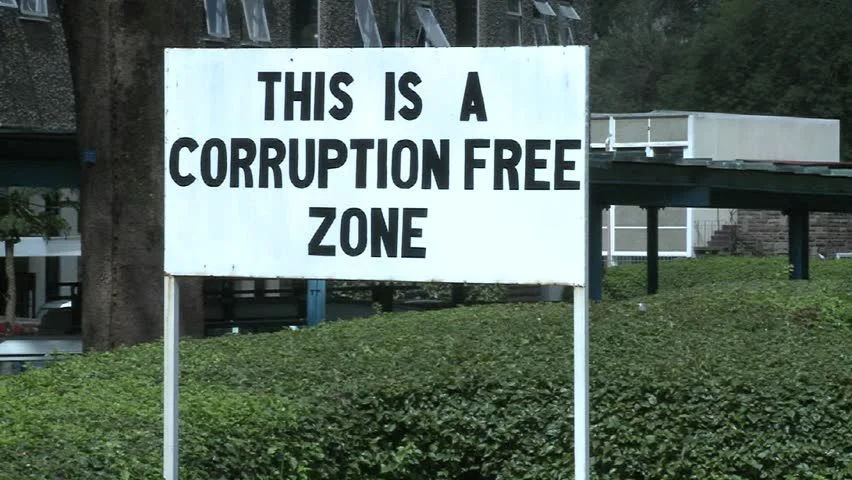On Good Friday morning, a disturbing event unfolded as I drove toward Citam Ngong to join the Men’s Chorale, the 28-year-old singing group I belong to. Barely 150 meters from the church entrance, a matatu in front abruptly stopped, blocking the road. Shamelessly, the conductor walked straight to a waiting police officer and handed him money — a blatant act of corruption executed in broad daylight.
Deeply troubled, I hooted loudly, moved ahead of the matatu, and stopped firmly in protest. The police officer approached my car confidently, saluting respectfully, “Habari Mkubwa.” Calmly yet firmly, I confronted him, “Officer, what you’re doing is shameful, totally unacceptable, and one day, it will catch up with you and your family.” Startled and ashamed, he stepped back, quietly responding, “I’m very sorry, sir. It won’t happen again.”
But, my greater concern wasn’t just the officer’s brazen act; it was the silent complicity of the matatu passengers- ordinary citizens- indifferent to the corruption unfolding openly before them. Later, sharing this incident with my choir colleagues, I was disheartened to learn, “This happens every day.” When did corruption become our normal?
Kenya, which is statistically about 80% Christian- and more than 11% Muslim — professes deep faith and strong values. Yet, daily life is riddled with corruption at every turn, humiliating and impoverishing God’s people. Corruption in Kenya isn’t merely an administrative inefficiency; it’s a moral and spiritual crisis bleeding our nation’s future.
Transparency International’s 2024 Corruption Perceptions Index ranked Kenya 121st out of 180 countries, scoring only 32 out of 100, reflecting a deep-rooted corruption crisis. According to the Ethics and Anti-Corruption Commission (EACC), Kenya loses approximately KSh 608 billion annually to corruption, about 8% of the country’s GDP. Our hospitals lose medicines meant for children, resulting in tragedies like that of a young mother in rural Kenya who recently lost her newborn because essential drugs had vanished due to corruption. Our roads claim lives due to the use of substandard materials funded by bribes. Schools struggle to educate, as funds disappear into corrupt officials’ pockets. Every bribe accepted is a life lost, a future stolen.
We recall the 2003 anti-corruption wave when President Kibaki galvanized citizens to actively reject corruption. Kenyans stood boldly against bribery in public, openly confronting corrupt officers. Sadly, that collective courage faded, replaced by resignation and passive acceptance. We are now back to a society of rent-seekers, where bribery permeates every interaction, from traffic checkpoints to government offices.
In the Bible, we read about Jesus’ radical confrontation at the temple. He would never silently tolerate corruption. He flipped tables, openly rebuking greed and exploitation. Even in today’s Kenya, he wouldn’t wait for change from above; he would ignite a powerful moral revolution from below, empowering every citizen to become an active leader and a courageous disciple.
Imagine such a transformed Kenya: teachers refusing to sell exam papers, nurses rejecting bribes, police officers proudly enforcing justice without compromise. Change, ignited at the grassroots, becomes unstoppable. Muslims recognize Jesus as a prophet of righteousness and integrity; his example transcends religious divides.
As I recently shared publicly, “This Easter, as Christ rose to give us life, may we rise to give the Earth a future. Let every community resurrect its purpose—to heal, to grow, to protect. For in restoring creation, we honour the Creator.”
I passionately call upon every Kenyan to embody Jesus’s radical courage. To our leaders in the Executive, Judiciary, Legislature, and religious institutions, reflect deeply this Easter and recommit to integrity and justice. To families, teach honesty and integrity to your children as core values.
Kenya’s redemption begins individually and courageously, echoing Christ’s bold confrontation of injustice. May this Easter inspire a revolution of integrity, restoring dignity, saving lives, and securing our shared future. Let each of us answer courageously: “What would Jesus do?” Then, let us go and do likewise. Think green, act green.


